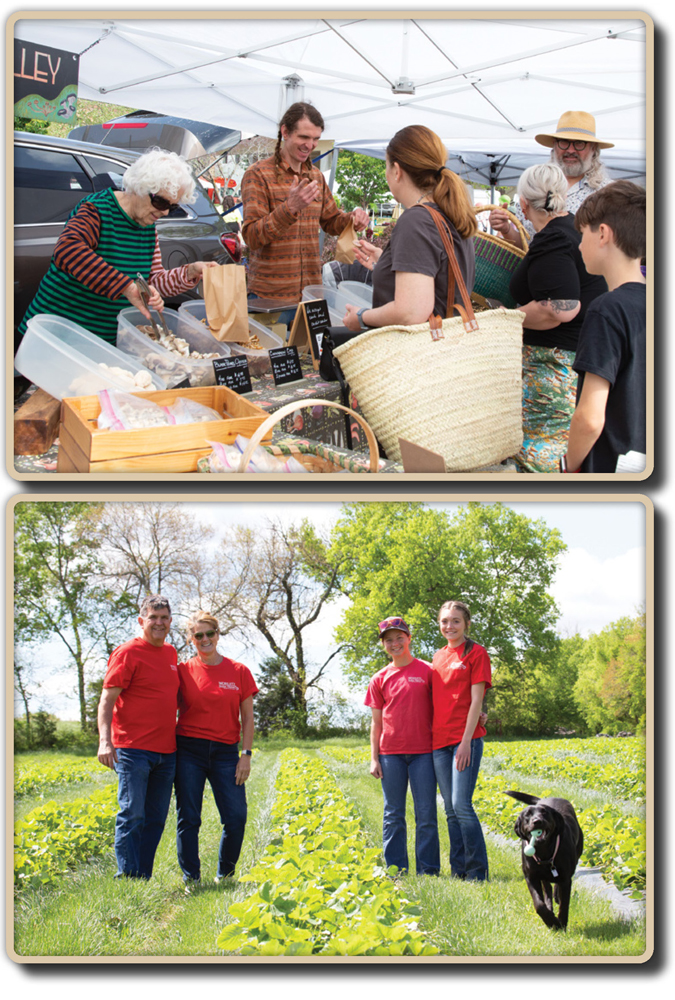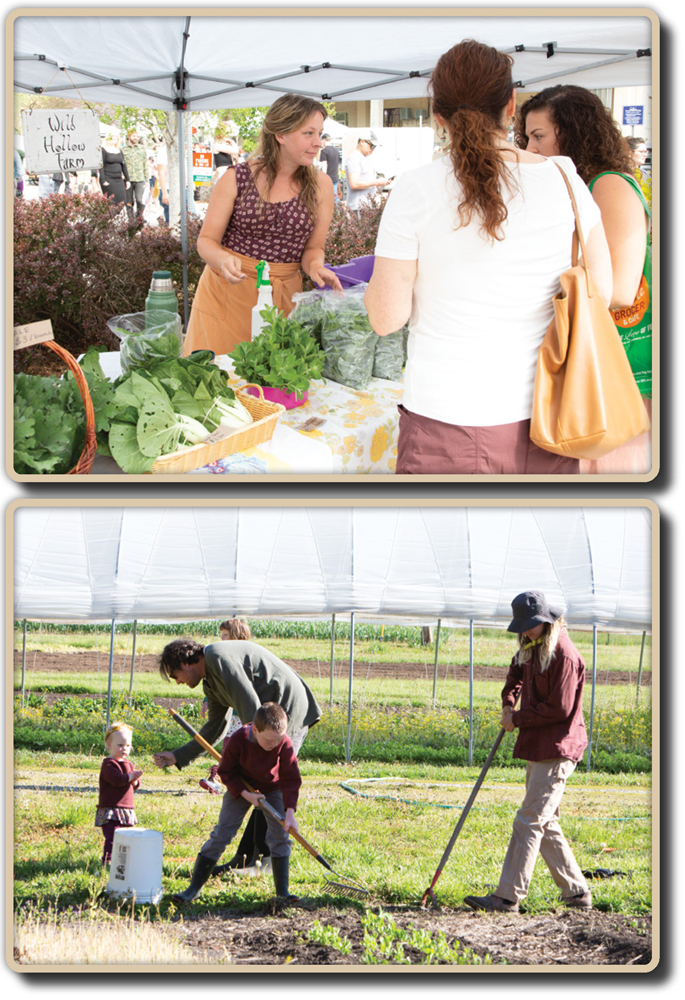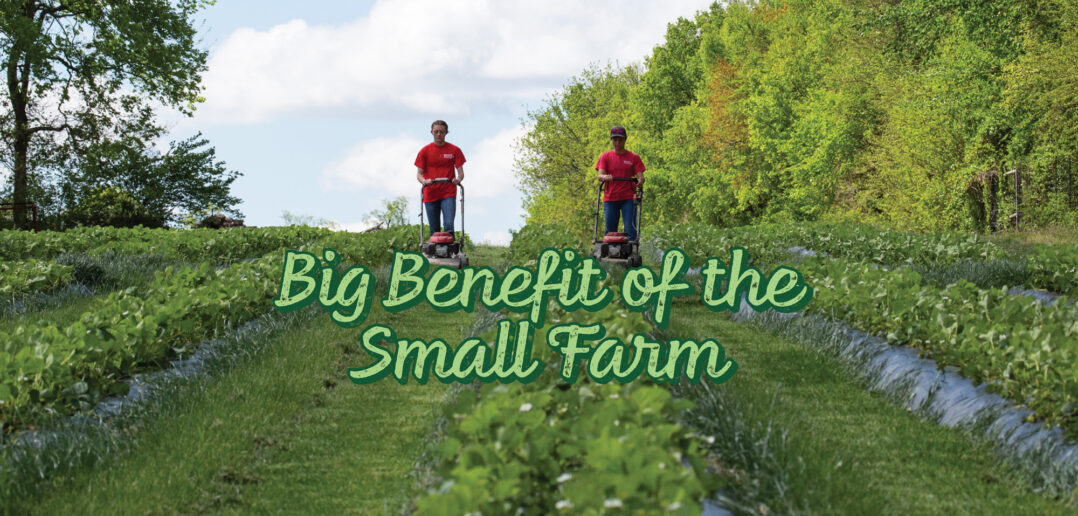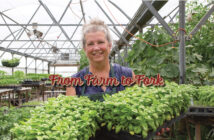| story by | |
| photo by | Steven Hertzog |
| OPEN A PDF OF THE ARTICLE |
Workers on small-scale farms run the gamut from teens to part- and full-time workers to those who want to someday run a farm of their own.

Abby and Liz mow between the rows of strawberries
Sometimes they are the friendly face at the Lawrence Farmers’ Market booth. Or the delivery driver who brings the farm’s bounty to local restaurants. Other times, they are the ones picking and laboring in the fields, covered in dirt and laden with sore muscles and tired hands.
Workers at small-scale food farms in Douglas County are key links in the food chain. Their literal and figurative fingerprints are all over the farm operations and products that come from our local land and nourish us.
Local farm owners hire a variety of folks to work, from seasonal to year-round, from part-time youth weekend help to full-time farm staff and interns hoping to be able to have their own farm someday. And everyone in between.
Full-Time Speed Ahead
Conor Brown returned to full-time farm work in January. He quit his full-time, nonfarming job and is back working for Mark Lumpe, at Wakarusa Valley Farm, where he has worked in various capacities and intensities since 2010. Lumpe, in his mid-60s, has been looking for someone who may be able to take over the farm. Brown would like to make that happen, as well.
A lot has changed at Wakarusa Valley since Brown first began working there. The farm is now a mushroom farm, growing many varieties of mushrooms for restaurants, the farmers market and retail. The cool, clean underground grow rooms are a stark contrast to the sunny, hot fields above that, 13 years ago, were filled with vegetables and salad greens. There are still vegetables that Brown grows at Wakarusa Valley, but he grows them under his own name, for the Rolling Prairie CSA instead of for Lumpe.
“I started working out here because of gardening,” Brown says. “I’ve ended up working with mushrooms. There’s a lot to learn about it.”
The mushroom grow rooms are in what he calls cave mounds: concrete mounds with soil piled on top. The mushrooms grow in sterilized 5-pound bags stuffed with substrate, which is like sawdust. Brown stuffs the bags (more than 100 of them) and sets the proper conditions, but the real work starts when the mushrooms begin growing. “Every day, at least half of my day is spent picking,” he says. “Mushrooms need to be picked every day, and I’m the only one who picks them.”
Brown says he enjoys the solitary element of the work with mushrooms—especially in contrast to the job he left in December, working in a group home.
LOCAL MATTERS
Our Local Advertisers – Making a Positive Impact
“I like the routine. I like going to harvest mushrooms, and there are just a whole bunch of them—going into the grow room and knowing I’m picking all these mushrooms, and people are going to be excited about them at the market,” he says.
Originally from Leavenworth, Brown graduated from the University of Kansas with a degree in anthropology. He pursued an anthropology graduate degree in Canada before returning to Kansas. He worked other jobs but kept feeling pulled to do gardening.
Though it sounds controlled and repetitive, Brown insists there is a lot of variety to mushroom farming, and it leads to new life experiences.
“I do like trying to grow new varieties—trying to get something new to grow and then eating it, because sometimes it’s something I’ve never eaten before,” he says.
He can counterbalance his time underground with fungi by working the fields for his own vegetables to sell to the CSA. Lumpe lets him use the farm’s land, and Brown grows about 20 different things for Rolling Prairie, including potatoes, onions, garlic, peas, carrots and radishes. Even when he was working elsewhere full-time, Brown was growing vegetables for restaurants, the market and the CSA on Lumpe’s land. Now, though he is doing very different projects, the vegetables and the mushrooms all add up to making a living as a farmer.
“As soon as I started farming, I hoped I could do it full time. I wasn’t sure I could get away with it, but here I am finally,” he says.

Connor Brown explaining the different mush¬rooms to a customer ; The Wohletz Family-Jerry, Jane, Abby and Liz in the fields
Farming as a Part-Time Gig
Wohletz Farm Fresh has been a family farm since 1996 and has been a “U-Pick” berry farm since 2009. Since last year, the farm has become exclusively strawberries and blueberries, which are harvested by farm visitors.
Jerry and Jane Wohletz own the farm and for years have hired teenagers to help with basic farm jobs, as well as to help host the farm’s guests when they come for picking. The berries are planted in December, but the work for berry season commences in earnest around spring break, when the workers uncover the plants and perform the tedious task of removing dead leaves from each individual plant.
The Wohletzes say they usually hire eight or nine teenagers as well as a couple of adults to work part time from spring break through the end of blueberry season, which is typically in August. Many of the teenagers return multiple summers to work.
“Something I’m the most proud of is that we are giving these kids their first job. There’s a lot of lessons that are learned,” Jerry Wohletz says.
Workers maintain the plants as well as the rows between the plants so that visitors can traverse the farm easily. They learn about ripe fruits and picking techniques, as well as how best to communicate with the public who come to the farm. “We are always telling them, ‘You’re representing our farm,’ ” he adds.
During the designated U-Pick days, the workers are stationed along the rows where picking is taking place. They instruct the pickers about which berries are ripe and show them how to pick properly, all while politely making sure that pickers stay on the grass and don’t trample or damage the plants.
The Wohletzes train the workers, and the longer-term workers instruct the newer workers along the way, as well.
“Jane and I are in the field with them. They learn their responsibilities and also the pace we expect,” Jerry Wohletz says.
Abby Keltner and Liz Mueting are in their fifth year of working at the farm. They began working at Wohletz in eighth grade and graduated from high school this spring. Keltner’s first responsibility on the farm was mowing the rows with a push mower, and Meuting started out weeding the plants. When they started, the farm was still growing produce for weekly farmers markets in Lawrence and Johnson County, so the young women say they were “always harvesting.”
Now, their work is focused on the strawberries and the blueberries. It hasn’t been a question for them whether they would come back each summer.
“The customers and the people you work with, that combination just makes you want to stay forever,” Keltner says.
The pluses to the job are obvious: the literal fruits of their labor. “No blueberry tastes the same as the ones at the Wohletz farm,” Mueting says. Keltner agrees, adding that her perceptions are forever altered by this work. “I will never see the berries at the grocery store the same again.”
They both have favorite ways to eat the berries: plain berries, muffins or strawberry shortcake for Mueting, and strawberry pancakes for Keltner.
There is no getting around the fact that it is hard labor at times. Both young women say they have shirts and shoes they designate only for work at the farm. They agree with each other that some of the hardest work comes at the end of the season, when they cut out the patches and plants, and end up covered head to toe in dirt.
This berry season will be the last for both Keltner and Mueting. Next fall, they are leaving for college at Washburn University (Keltner) and Wichita State University (Mueting), with no further plans for farming or agricultural studies of any sort.

Lacy Myers working their stand at the market; Bobby working on the farm with their children
From Worker to Owner
Lacy Myers is looking at her farming work experience from the proverbial other side of the fence. After nearly 10 years of working for other farmers and raising vegetables planted on other people’s land, Myers and her husband, Bobby Sauder, purchased Wild Hollow Farm in fall 2020. Both had worked for Lumpe at Wakarusa Valley Farm, and Sauder had worked at Pendleton’s and Washington Creek Lavender, while Myers also had worked at The Merc. Wild Hollow is a vegetable, fruit and flower farm, and both Myers and Sauder have brought their knowledge from previous farmwork to Wild Hollow. They have one employee, as well.
“The goal of any farm should be to provide a volume of produce but also to provide good-paying jobs that are respectful of the employees. You should make the farm a place where employees feel at home and are part of a collaborative effort,” Myers explains.
Not all farm employees are necessarily working toward the goal of owning their own farm, she adds.
“I don’t know when we moved from ‘We like farming’ to ‘Let’s have our own farm.’ It’s a wonderful lifestyle if you want to spend time with your family and be outdoors,” Myers continues.
All kinds of people from all types of backgrounds work at farms, yet Myers has noticed some common characteristics that local, small-scale farmworkers seem to share: stubbornness (the attitude of “I’m not going to let anything beat me”); enjoyment of hard work; an appreciation of the cycles of the environment, the seasons and the weather; and a sense of humor.
The workers can focus on the short term, she says, while “the farmer definitely has the mental load” of the bigger picture and the whole operation. That can be both a privilege or a burden, depending on the worker.
“You can be as interested or disinterested as you want to be in what all is happening at the farm. If you’re interested in having your own farm someday, there is infinite opportunity to learn,” Myers says.
Small-Scale Farms, Big-Time Benefit
The farm lives of Brown, the Wohletzes, Keltner and Mueting represent smaller-scale food farms in Douglas County and are not reflective of factory farms or large operations that rely on migrant workers or have unions. It is safe to say with all the knowledge and work experience generated at these local farms, the people on Douglas County farms are extracting much more than vegetables from the soil. And they are contributing much more than the food on local residents’ plates.
“Farms that can have employees and have them year-round in Kansas, that’s a feat. For it to really be a part of the economy, you’ve got to have year-round employees,” Brown says.




